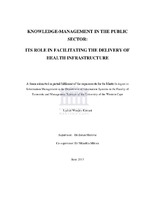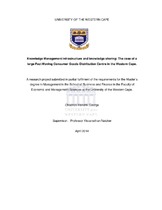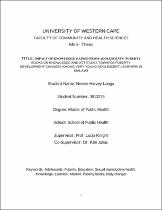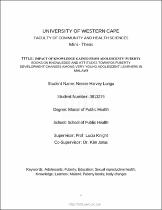Knowledge-management in the public sector: Its role in facilitating the delivery of health infrastructure
Abstract
Knowledge is recognised as a crucial resource in the knowledge-based economy; and it is
believed to drive sustainable success in organizations. Knowledge management (KM) helps
organizations identify, create, organize, distribute and transfer vital knowledge among
employees within and across organizations. The underlying premise is that good KM leads to
efficiency and effectiveness, which in turn, influences the total performance in an
organization. Therefore, this study investigates the role of KM practices as they relate to
projects in a South African government organisation. The problem was dwelt with by
establishing research questions and objectives.
In order to answer the research questions, a literature search was conducted in the area of
KM to establish the KM enablers, barriers, and processes known to facilitate or hinder
successful KM in organizations. This led to the identification of five enablers, including
organizational culture, structure, technology, strategy and leadership, as well as the
resources believed to be fundamental in the success of KM practices. Barriers to KM were
identified as individual, organizational and technological. The study established four KM
processes: acquisition, conversion, application and protection that were found to concur with
good KM practices. A conceptual model was developed around these areas. The model
assisted in developing qualitative and quantitative questions. In order to investigate the
proposed research questions, the study identified a single directorate within the department of
public works that is directly involved with the delivery of health infrastructure.
The methodology used, which was mainly qualitative research, was conducted by using
multiple-data evidences, namely: semi-structured interviews, document review; these were
sourced from primary and secondary sources, as well as similar organizational best practices
in KM. A total of nine interviews were conducted with individuals in managerial positions. A
total of 7 of the 30 e-mailed questionnaires were completed and the data were used to
supplement the qualitative data. This study used the Content-Analysis Technique approach to
analyse the text data obtained from the interviews.
It was established that successful KM implementation requires the promotion of an enabling
environment. The results from the findings revealed that organizational culture, structure,
leadership and strategy, ICT, as well as KM resources form, a foundation for the KM
environment. KM processes, such as knowledge-retention, creation, capture, transfer and
iv
sharing, were found to be fundamental for KM practices to occur. Barriers to effective KM
occurred largely due to the lack of awareness and time. To capitalize on knowledge, an
organization must be prepared to balance its KM enablers and processes. The existing
challenges impeding KM success should be identified and dealt with, in order to realize the
KM benefits. The study, therefore, proposes a KM conceptual model to be integrated with
the decision-making framework, as an implementation strategy for KM in the public sector.
This would ensure an embedded knowledge-intensive environment in the Department, and
hence the improvement of infrastructural delivery.
This study is limited, since only a single case was used, which plainly suggests that there is a
possibility that the results cannot be generalized beyond the researched organisation –
without conducting any further study.
It is recommended that for future research, this study be replicated through several other
directorates, or even departments at various government levels (e.g. national, provincial).
Also, quantitative analysis, together with qualitative analysis, should be used to create a
triangulation between the two approaches.
Related items
Showing items related by title, author, creator and subject.
-
Knowledge management infrastructure and knowledge sharing: The case of a large fast moving consumer goods distribution centre in the Western Cape
George, Chadrick Hendrik (University of the Western Cape, 2014)The aim of this study is to understand how knowledge is created, shared and used within the fast moving consumer goods distribution centre in the Western Cape (WC). It also aims to understand knowledge sharing between ... -
Impact of Knowledge gained from adolescents' puberty's books on knowledge and attitudes towards puberty development changes among a very young adolescent learners in Malawi
Lungu, Nennie Harvey (University of the Western Cape, 2022)Introduction: A distinct subgroup of adolescents, very young adolescents (VYA) aged 10 to 14 are going through one of the most important life transformations. For adolescents to develop the healthy behaviors that can ... -
Impact of knowledge gained from adolescents’ puberty books on knowledge and attitudes towards puberty development changes among very young adolescent learners in Malawi
Lungu, Nennie Harvey (University of the Western Cape, 2022)A distinct subgroup of adolescents, very young adolescents (VYA) aged 10 to 14 are going through one of the most important life transformations. For adolescents to develop the healthy behaviors that can influence their ...




